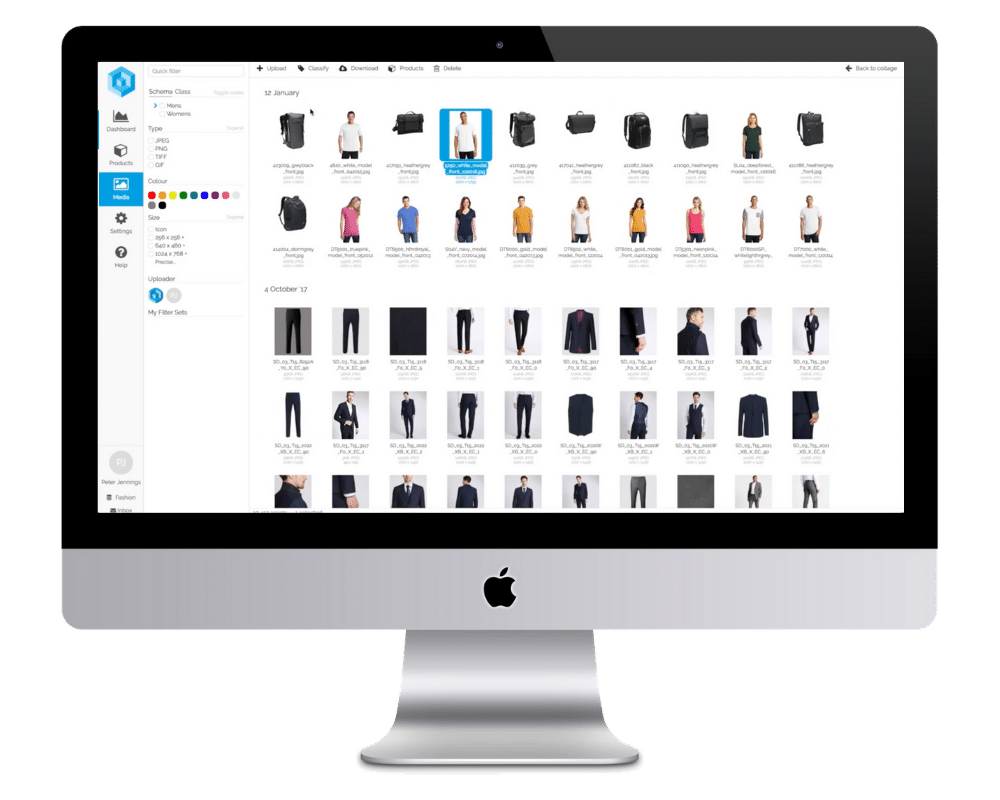
Who needs an eCommerce platform?
One more crucial angle to consider when choosing the best eCommerce platform is to go over other aspects, such as customer service quality and simplicity of usage. Every internet-based company needs a website or an eCommerce platform. eCommerce platforms offer tools and services to help you run your business and assist in shaping its online image.
A website builder integrated into the eCommerce platform is essential to create a unique website under your domain name. However, launching your online store straight on one of those platforms can be preferable if your company depends on a marketplace for sales, such as Etsy or Amazon.
An eCommerce platform is software that allows company owners to create an online shop and sell goods and services online. Most eCommerce systems have features for running sales, marketing, and operational departments. The top 4 characteristics include:
● Webshop developer
● Inventory management of physical products
● Inventory control
● Customer service roles
An essential component of every internet business is a web shop. Your online shop is only as good as your eCommerce platform. Basically, your eCommerce site is the primary location to develop consumer interactions and brands. Therefore, it goes beyond simply selling goods.
Using the best software
The top eCommerce systems enable you to increase sales and improve consumer satisfaction. They work with you, not against you. In other words, they enable you to reach your goals, as opposed to acting as a burden or a tedious tool just for the sake of tracking data. eCommerce systems are built with ease-of-use in mind because winning customers require adaptability and on-the-spot thinking from their eCommerce professionals. Consequently, today’s top platforms are both easy-to-use and granular at the same.

Setting up and running an online business is made simple with the top eCommerce systems. By selecting the leading eCommerce platform, you’ll have access to all the resources you need to quickly and easily build an engaging and feature-rich online storefront and a knowledgeable support team to help you along the way.
However, selecting one of them might be complicated because of the abundance of eCommerce platforms and programs available. Nevertheless, there has never been a better moment to launch the initial online store or move your physical business online; building an eCommerce site, even from scratch, has never been simpler.
A wide range of top eCommerce platforms includes payment gateways, shopping cart software, an intuitive editor, and enough themes, models, and options for customization to set your store out from the competition. Even further, evaluating each eCommerce platform will help you select the best option for your business. Let’s explore some of the top eCommerce platforms available to find the right fit for your needs.
How to choose the best platform for eCommerce
Here are some things to think about when choosing the best platform for an eCommerce website. For instance, if you possess an online store and want to find an alternative to grow and maximize your business and sales, here’s where you’d start:
Key Features
Maintaining the security of your data and your clients should always come first. Most often, the best eCommerce solutions will provide you peace of mind about managing data and payment processing; choosing a different option may damage your business and drive away devoted clients.

Also, the best platforms for eCommerce have custom eCommerce features. Backend programming, and coding are the most crucial aspects of developing an eCommerce website. Therefore, they are also important if you would like your company to run smoothly and have an advantage over the rival platforms for eCommerce.
Creating an eCommerce website involves ongoing maintenance and support to keep it up-to-date and fully functional. However, switching to a new platform can prove to be a challenging effort.
Consequently, it’s essential to choose one that integrates seamlessly and affordably with your existing systems and solutions.
Payment Gateways
Having a platform that works with well-known payment processors like Stripe, PayPal, and Square is crucial. How the platform handles online transactions is another essential factor to consider. Essentially, offering a variety of payment choices to your clients can improve their purchasing process and increase conversions on your eCommerce site.
Determine which payment gateways are the platform’s default options and whether integrating well-known processors costs money. It’s critical to have a range of third-party providers of payment as they have the power to make or break a sale.
Look into any transaction costs you should consider when creating your pricing plan. Additionally, remember that specific platforms take a cut of your earnings if you exceed a particular plan’s sales cap.
Advertising Channel Compatibility
Businesses that integrate multiple online and physical channels through a strong omnichannel strategy tend to be the most successful, as they deliver a consistent and engaging customer experience. An essential part of this approach is leveraging social commerce.
These days, a lot of social media sites serve as hubs for online purchasing in addition to being entertainment venues. Now that customers can purchase in-app on Facebook, Instagram, TikTok, and Pinterest, retailers can sell countless options on these platforms.
In other words, if you’re a B2B business, go for an eCommerce platform for B2B that can work with multiple advertising channels. BigCommerce is considered the best eCommerce platform for B2B.
Customization
Enhancing the online buying experience for clients is dependent primarily on web design. It motivates customers to spend more time perusing your online shop and making purchases. An excellent eCommerce platform spares consumers from starting from scratch when it comes to site design by offering customizable templates or themes. Even further, to ensure mobile compatibility, look for an application that offers contemporary, responsive designs.

Additionally, a lot of eCommerce systems provide a user-friendly drag-and-drop visual editor. This editor saves you time while creating a website without modifying code. This function is quite helpful for those new to web programming and design.
Cost Effectiveness
Consider the long-term expenses while choosing the ideal eCommerce system for your company. Choose a few eCommerce platforms or packages that work for you, then evaluate the features and costs of each.
A SaaS eCommerce platform will require monthly or annual membership payments from you. Meanwhile, to use a free and open-source platform, you must buy a domain name hosting provider and pay renewal costs.
Remember that themes, extensions, and marketplace integrations may incur additional fees. In essence, pick a scalable software for what ultimately is your eCommerce platform that works within your budget and can steadily support the expansion of your company.
Customer Support
Problems could come up when developing or managing your website. To assist you in resolving any issues, pick an eCommerce platform that offers thorough documentation and dependable customer service. Every eCommerce platform provides varying degrees of assistance. While some offer only email and ticket help, others provide live chat or phone support around the clock.
Any help is beneficial, but keep your needs and skill level in mind. For instance, round-the-clock service is more advantageous if you have yet to achieve the proper amount of expertise in creating or managing eCommerce sites.

User Friendliness
Running an internet shop is a difficult job. As a result, you need to pick a platform for online selling that makes the procedure simple. To make item listing, online payment processing, and inventory management simple, look for an interface that is primarily easy to use.
If you use a SaaS platform, select a plan, register, and begin developing the website. This kind of eCommerce platform is ideal for novices as it often provides security and upgrades for you. In fact, many features that seem complex are out-of-the-box.
If you use an open-source platform, before installing the program, you must pick a hosting company and buy a domain. In addition, you will be in charge of applying the necessary security precautions and upgrading features (for more seasoned users, this is the ideal alternative if not using a SaaS platform).
Largest eCommerce platform
‘What is the best eCommerce platform?’
eCommerce platforms provide the foundation for a successful online store, going beyond just attractive design or organized products. The best online shopping platforms excel in several key areas that contribute to a superior user experience. Below are some of the top eCommerce websites, along with the factors that contributed to their success—a list that invites comparison of the leading eCommerce platforms.
eBay
Founded in 1995, eBay is an American eCommerce firm. They are the best eCommerce platform for retail in the world as well as the top consumer-to-consumer marketplace globally. Ebay’s global delivery network serves approximately 190 nations and territories. Additionally, they have around 132 million international customers.
On eBay, they do not require buyers to pay any transaction fees. On the other hand, sellers have to pay to put products on the eCommerce site. Thus, things are very different.
Basically, all you have to do to sell on eBay is create an account and post your goods. Each listing has a $0.35 non-refundable insertion fee after the first 250, which is free.

Amazon
Founded in 1994, Amazon is an American software firm. Initially, the business operated as an online bookseller. However, Amazon has expanded to become the most significant retail business in the world. Amazon US is by far the most popular eCommerce website in the US, with up to 2,200 visitors per month (including mobile and computer) in February 2023.
Nineteen additional countries outside the US are home to Amazon operations. Sellers may contract with Amazon to handle order fulfillment through their “fulfillment by Amazon” service. Amazon FBA uses the dropshipping business concept. Amazon is a third-party connection on pretty much every eCommerce platform list.
AliExpress
The Alibaba group owns the eCommerce site AliExpress. It was established in China in 2010 and is a B2C marketplace. International purchasers are the target market, and most vendors are from China. However, Aliexpress does not serve customers on China’s mainland. The website supports sixteen languages: English, Italian, Dutch, Portuguese, Spanish, and French.
Rakuten
The second-biggest eCommerce site in Japan is called Rakuten Ichiba. In addition to eCommerce, the Rakuten Group manages more than 70 companies with 1.7 billion global clients. With over 100 million customers, Rakuten Ichiba represents around 79.6% of Japan’s population. Rakuten has had a firm hold on the Japanese eCommerce business since its founding in 1997. Since its launch in 2002, Rakuten’s reward program has awarded over $23 billion in Rakuten Points. The Rakuten Marketplace is another significant option that allows foreign vendors to use Rakuten Ichiba.
Walmart
Founded in 1962 in Rogers, Arkansas, Walmart is an international retail business in the United States. They currently run various eCommerce websites, 10,500 shops, and clubs throughout around 19 countries. Walmart operates under many brands, including Supercenter, Discount Stores, and Neighborhood Market, in all 50 US states and Puerto Rico.
Walmart is becoming a significant player in eCommerce. Approximately 240 million people visit walmart.com every week. A few eCommerce websites, including art.com, jet.com, modcloth.com, hayneedle.com, and others, have also been bought by them.

Wildberries
Tatyana Bakalchuk founded Wildberries in 2004, and since then, it has grown to become Russia’s leading eCommerce site for a wide variety of goods, including electronics, apparel, cosmetics, and home furnishings. The corporation, which operates in seven countries, including Kazakhstan, Belarus, and Armenia, has its headquarters in Moscow.
In 2021, Wildberries began to expand into the American market in addition to several European Union countries, such as France, Spain, and Italy. It is the fourth most popular marketplace for goods online in Europe as of July 2022. Owing to the company’s success and global reach, Tatyana Bakalchuk is currently the wealthiest woman in Russia.
Flipkart
India’s eCommerce giant Flipkart was established in 2007 by Sachin and Binny Bansal. At first, the site primarily focused on selling books, but it soon broadened the range of goods it offered to include food, gadgets, clothing, household necessities, and much more. Flipkart has emerged as one of the prominent new eCommerce platforms nationwide, with its main office in Karnataka, India.
One of the most significant eCommerce transactions ever occurred in 2018 when the American retail behemoth Walmart bought a sizable portion of Flipkart, providing the Indian startup with massive funding.
eCommerce platform for B2B
Business-to-business digital commerce, or B2B eCommerce, is a business model where a firm sells to another company rather than a consumer. The popular eCommerce platforms for B2B businesses, along with their best characteristics, are mentioned below:
Shopify Plus
Shopify Plus is one of the best cutting-edge, adaptable B2B eCommerce platforms that simplifies serving B2B clients from one location. With the ability to streamline internal procedures and access customer-specific items and prices, Shopify’s Wholesale Channel enables you to provide individualized shopping experiences. In addition, it enables your business-to-business (B2B) clients to make orders with you by email or phone 24 hours a day, and provide them access to your pricing and product descriptions.
NetSuite Commerce
For businesses looking to build captivating purchasing experiences, both B2B and B2C may choose NetSuite Commerce as their most used eCommerce platform. An integrated overview of customers, inventories, and orders is made possible by its integration with the leading NetSuite business platforms. NetSuite Commerce caters to B2B clients like Bailey Hydraulics and Barcoding. Thompson Tee and Ryan’s Pet Supplies are a couple of its B2C clients.
OpenCart
You may download, edit, and integrate OpenCart, a free online shopping cart, with your already-existing website. If you don’t have a programmer on your team, the tiny price tag may be deceiving because open-source software requires extensive web development experience. Web hosting will also require extra payment.
You expand the Platform’s B2B functionalities with the $299 OpenCart B2B Multi Vendor Marketplace add-on, which allows you to seek price quotations and make custom orders for goods that aren’t featured. However, some B2B vendors should be able to get by with the free version.

Adobe Commerce
Magento was the old name of Adobe Commerce. Customers may create accounts that several team members can access, and you can set up and administer websites for many businesses using this B2B eCommerce platform.
Adobe Commerce pricing is quote-based; thus, you must explain your needs to a customer service agent to receive an estimate. You can centralize your B2C and B2B operations in one place with Adobe Commerce, which also provides custom pricing, sales channels, nations, inventory management, and product catalogs. It offers services to clients, including FoodServiceDirect.com, Liebherr, and HP.
Shift4Shop
Payment processing business Shift4 is the owner of Shift4Shop, formerly known as 3dcart. Free for those who utilize Shift4 to process at least $500 in sales each month, the service provides many choices for B2B eCommerce companies. It is a great option, given its price and feature set.
If you use Shift4 to handle at least $500 in debit and credit card transactions each month, Shift4Shop is free. You can create many pricing levels for varying volumes and client kinds with Shift4Shop and even provide wholesale pricing with restricted purchase amounts. Additionally, you may make price lists tailored to particular clients.
WooCommerce
For WordPress websites, WooCommerce is an open-source e-commerce platform. It functions as a WordPress plugin and enhances any WordPress website with shopping capabilities, including shipping, payments, and order management.
From there, you can utilize extensions to give your store other features like rotating 360-degree product images, numerous currencies, and subscriptions. For extra assistance with setting up and deploying your website, you may also collaborate with a qualified partner known as a WooExpert. WooCommerce B2B is a plugin that gives you the extra capabilities to sell to B2B organizations, specifically for B2B sales. Many users consider WooCommerce to be the best platform for an eCommerce site.

PrestaShop
PrestaShop is one of the best open-source, eCommerce platforms for free use by over 300,000 companies of various kinds. Also, PrestaShop is simple to use if you sell directly to customers. You’ll need more modules from PrestaShop’s official marketplace to implement more powerful eCommerce features.
Capabilities include B2B authorization, payment guidelines, VAT verifications, and personalized discounts by B2B-specific modules. Danone, Freshly Cosmetics, Sheds Direct, and Cooltra are just a few of the clients that PrestaShop supports.
NuORDER
A B2B platform designed for merchants and brands is called NuORDER. It facilitates the management of businesses’ wholesale operations and makes it simple for retailers to locate the ideal items, view assortments, and place orders.
Buying and marketing teams may collaborate, create whole product collections, and plan assortments with NuORDER. Brands including Asics, Nordstrom, Bloomingdale’s, and Steve Madden are the partners of NuORDER. It provides services to 500,000 shops and over 3,000 brands.
Best small business eCommerce platform
Based on the support they provide to small businesses, here are the best eCommerce platforms for a small business to upscale their profit:
Shopify
A B2B platform designed for merchants and brands is called NuORDER. It facilitates the management of businesses’ wholesale operations and makes it simple for retailers to locate the ideal items, view assortments, and place orders.
Buying and marketing teams may collaborate, create whole product collections, and plan assortments with NuORDER. Brands including Asics, Nordstrom, Bloomingdale’s, and Steve Madden are the partners of NuORDER. It provides services to 500,000 shops and over 3,000 brands.

Wix
Small companies on a tight budget are the primary market for Wix, a free e-commerce website builder. Plans start at $27 and go up to $59 per month. Thus, even the priciest goal is cheaper than the Shopify mid-tier one.
You may include many capabilities for which you would need to pay several hundred dollars a month on other platforms with Wix’s affordable options. Abandoned cart emails, digital goods, integrated SEO tools, immediate form shipping costs, and tracking are included in all plans.
BigCommerce
Many people rank BigCommerce as the best eCommerce platform for dropshipping in 2025. BigCommerce powers thousands of eCommerce companies through its eCommerce platform. Despite having several eCommerce tools and capabilities, it is only appropriate for stores with very specific needs.
Depending on your package, the monthly fee varies from $29 to $299. There are no charges for transactions and limitless items with any plan. In addition, it offers a respectable mobile eCommerce experience. Because of these factors, it has the upper hand over many other eCommerce platforms. However, it needs to catch up regarding loading speed, which may irritate customers.
Square Online
Square offers an eCommerce website builder called Square Online, which started as Square Online Store. The payment processing solution that Square is most known for works with many eCommerce sites on this list. They decided to enter the eCommerce platform industry. You can get started fast if you currently have a Square account. Establishing your business is still simple if you haven’t used Square before.
Additionally, Square offers Square Online Checkout, which enables owners of small businesses to take online payments without having to create an Internet store. It is not possible to utilize a custom domain with the free version. It compels you to run Square adverts on your website. Monthly payments for paid plans begin at $29, with an annual billing reduction. For these reasons, many consider Square Online to be the best eCommerce platform for beginners.
Weebly
An excellent eCommerce platform for small enterprises needing a primary internet store is Weebly—also marketing automation into it. Weebly is also a great choice, requiring third-party software to access those capabilities on other platforms, such as Shopify. Depending on the package you select, Weebly’s eCommerce platform might cost you anywhere from $16 to $29 monthly.

You may select a different eCommerce platform if performance and speed are your top priorities. Most eCommerce websites load in 3.2 seconds on average. In fact, an average Weebly website loads in 3.8 seconds. It may not seem like much, but you can forgive it, given how quickly things change online.
eCommerce platform comparisons
The reason there are so many considerations to keep in mind while choosing the best platforms for eCommerce; here are some prominent eCommerce platform comparisons:
Shift4Shop
Shift4Shop is a noteworthy B2B eCommerce platform with features including personalized pricing for recurring clients, preorders, wholesale pricing choices, and a broad range of payment methods, like paper checks and money orders. You may use it to sell to individual customers as well.
Pros
- Wholesale and customized prices for customers.
- Several different payment options.
- Preorders are also an excellent way to get tickets for events.
Cons
- There is no pricing transparency while processing payments.
Big Cartel
Big Cartel is a primary online retailer. With its free edition, you may only sell five things at a time, including appointment scheduling, ticket sales, inventory management, and marketing tools. However, for some firms, listing your items, running promotions, and collecting sales tax is sufficient.
Pros
- Not a single charge aside from payment processing costs.
- You could provide coupon codes.
- Customers are provided with information on shipment tracking.
Cons
- Product listing restrictions. There are simply five things in the free plan.
- You have to buy the domain name from someone else.
Wix
Wix is an online shop builder with specialized features for businesses in the restaurant, hotel, and fitness industries. Additionally, Wix offers over 500 free design themes and allows you to choose any payment processor without incurring extra fees from Wix, giving you more options to personalize your website.
Pros
- Tools for marketing appointments, tickets, exclusive material, and more in addition to tangible goods.
- Specific instruments for fitness establishments.
- Numerous complimentary themes.
- The credit card processing business of your choice.
Cons
- Storage caps: The Basic plan includes 50 GB of storage and five hours of video.
- Integrations with other markets, such as Instagram and Amazon, are made easier by third-party programs.

BigCommerce
BigCommerce is a platform for online shopping that may assist in enabling omnichannel commerce, in which your company sells goods across several platforms while controlling inventory and income from a single dashboard. Numerous online sales channels, including Facebook, Instagram, TikTok, Amazon, eBay, and Google Shopping, are integrated with BigCommerce.
Pros
- You can check it out with a free trial
- Native connections to several other sales channels.
- The capacity to launch new stores and run several brands.
- For all plans, there are infinite user accounts.
- As you upgrade to more expensive membership options, payment processing prices will decrease if you use Braintree for payment processing.
Cons
- The lowest plan has a maximum yearly sales volume of just $50,000.
- There aren’t many free themes available to customize your website.
Etsy
You’ve undoubtedly heard of Etsy if you purchase handcrafted items; the website is practically a byword for arts and crafts. Before you wholly form your business, Etsy makes it simple to start a store and sell items; for example, you can alter your shop title up to five times without Etsy’s assistance. However, you’ll have to pay hefty transaction fees for that convenience.
Pros
- Specializes in handcrafted products.
- You don’t have to create your own website.
Cons
- The total cost of transaction and processing fees for payments is 9.5% + 25 cents for each sale.
- To get a dedicated URL, you’ll need to switch to a premium membership.

Bottom Line
There are several contenders for the most used eCommerce platform, each with distinct characteristics, pros, and cons. You can decide which eCommerce platform suits your business needs depending on your business’s size, scale, and requirements. However, If you require management tools or top-notch systems for your eCommerce platform, you can contact us at Pimberly for the best service around you.












